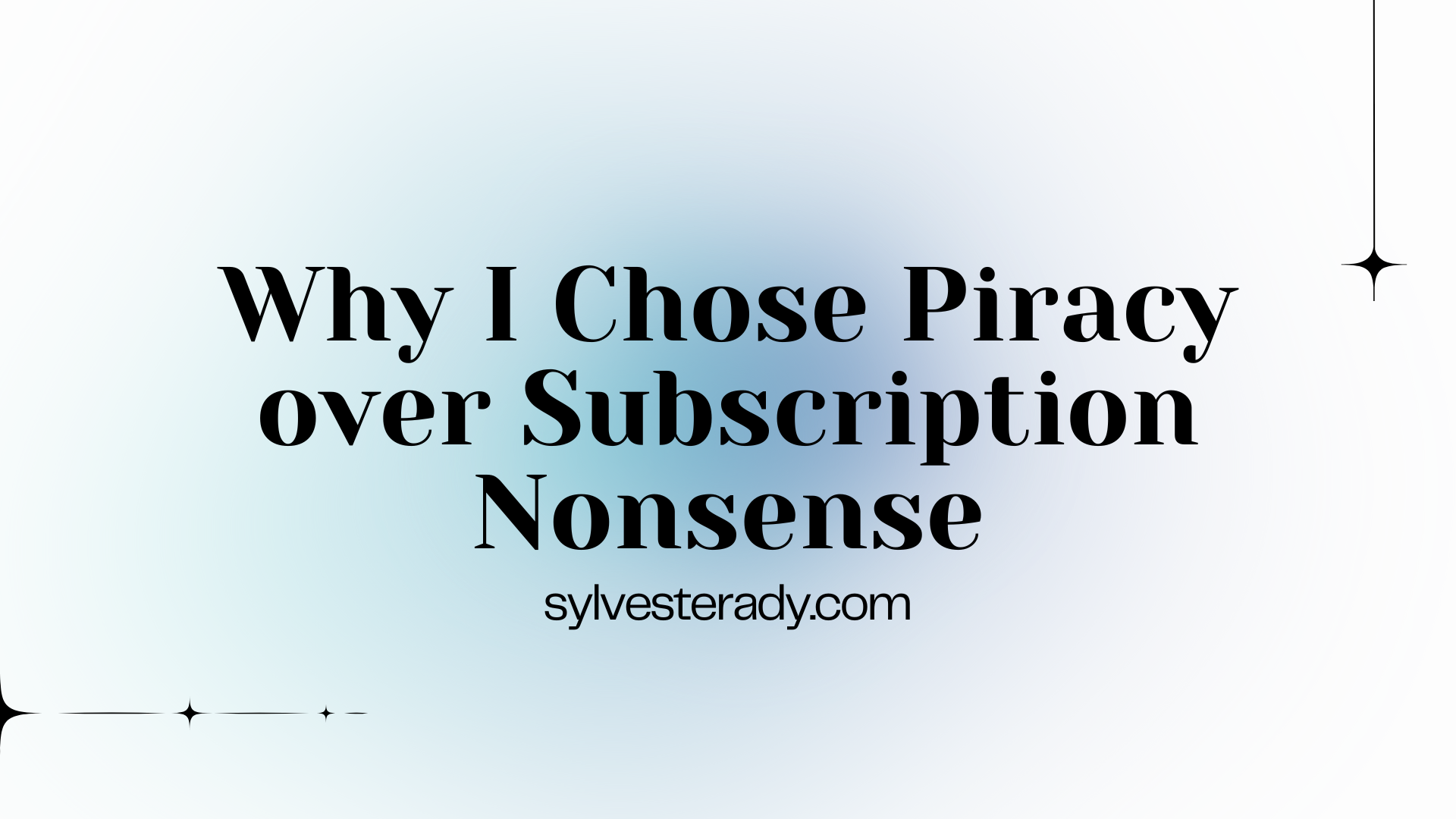Alright, so buckle up, because this might get a little spicy. I’m sitting here, drowning in assignment deadlines and fueled by instant noodles (the glamorous student life, eh?), and I keep bumping into the same conversation online and IRL: the absolute madness of subscription services. And yeah, I’ve gotta be honest – more often than not, I find myself sailing the high seas of the internet instead of paying ransom for every single movie, song, or piece of software I want to use.
Before anyone jumps down my throat, hear me out. This isn’t me standing on a soapbox shouting “Stealing is awesome, yay!” It’s more like… a frustrated sigh turning into a pragmatic decision. Because honestly? The whole subscription economy feels less like convenient access and more like a digital shakedown.
Remember when Netflix was the thing? One subscription, tons of stuff. It felt revolutionary! Now? Pfft. You need Netflix for Stranger Things, Disney+ for Marvel, Max (or whatever they’re calling it this week) for HBO stuff, Paramount+ for Star Trek, Peacock for… well, whatever’s on Peacock, Hulu for other things… I could go on. Each one wants its RM30-RM50 a month. Add Spotify or Apple Music for tunes, maybe Adobe Creative Cloud if you’re into design or video (which, as a student dabbling in creative stuff, ouch), Microsoft Office, a VPN, maybe a premium version of some study app… Suddenly, you’re looking at a bill that rivals a small car payment just to access digital stuff.
As a student, my budget is basically held together with sticky tape and wishful thinking. Forking out RM50+ a month purely on media subscriptions? That’s my food budget for a week, easily. It just feels unsustainable and, frankly, kind of greedy on the companies’ part. It’s the classic “death by a thousand cuts” – each little subscription seems manageable on its own, but together? They bleed you dry.
And it’s not just the cost! It’s the sheer inconvenience. Trying to remember which service has that one specific movie you want to watch? Good luck. Half the time you search, find it, click, and BAM! – it’s moved to another service you don’t subscribe to. Or worse, it’s just… gone. Vanished into the digital ether because some licensing deal expired. Seriously? How is that better than just having the file?
With subscriptions, you don’t own anything. You’re renting access, and that access can be revoked or changed at any time. The movie you loved last month might disappear tomorrow. The software you rely on could switch to a subscription model you can’t afford (looking at you, various creative apps!). There’s zero permanence. It feels incredibly flimsy.
Then there’s the fragmentation. My music is on Spotify, my shows are scattered across five different apps, my design work needs Adobe’s blessing… it’s a digital juggling act. Piracy, for all its obvious downsides (and yeah, we’ll get to those), often centralizes everything. Need a movie? A song? An old piece of software the company stopped supporting years ago but you still need for some obscure reason? Chances are, you can find it in one type of place, without needing six different logins and credit card details scattered across the web.
It feels like companies have sliced the digital pie into so many tiny, expensive slivers that they’re genuinely surprised when people just swipe the whole pie instead. They create artificial scarcity – like geo-blocking content or delaying international releases – in a world where digital distribution could be global and instant. Why should I have to wait months for a show available elsewhere, or be completely blocked from watching something just because of where I live, when the internet makes those borders meaningless?
Okay, okay, I know what you’re thinking. “But piracy is illegal! It hurts creators! There are risks!” And yeah, you’re right. I’m not delusional. There are definite ethical gray areas. Downloading dodgy files can absolutely invite malware onto your computer – I’ve learned that lesson the hard way once or twice (hello, frantic laptop wipe). And yes, creators – writers, musicians, filmmakers, developers – deserve to be paid for their work. 100%.
But here’s the rub: does my RM30 a month to Netflix really translate into fair compensation for the indie filmmaker whose movie I watched once? Or does most of it go to shareholder profits and marketing budgets? The system feels broken from that end, too. When the legal, paid options feel exploitative, inconvenient, and increasingly fragmented, can you really blame people for looking for alternatives?
For me, it boils down to frustration. I want to pay for stuff. I’d happily pay a reasonable price for a service that offered a wide library, treated consumers fairly, and actually let me feel some sense of ownership or reliable access. But that service doesn’t really seem to exist right now. Instead, we get walled gardens demanding ever-increasing fees for ever-shrinking slices of content.
So, yeah. Until the subscription model stops feeling like a relentless cash grab designed to inconvenience users as much as possible, the Jolly Roger is going to look pretty tempting to a lot of people, myself included. It’s not necessarily about wanting everything for free; it’s about wanting access without the ridiculous cost and hassle the current system imposes. Maybe instead of pouring money into DRM and lawsuits, companies could try… I don’t know… offering a better service? Just a thought.
